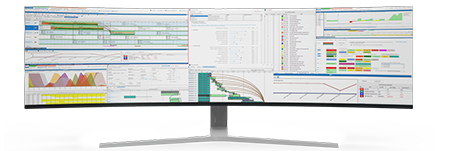Supply chain managers face unprecedented challenges that require innovative solutions in medical manufacturing. One such solution gaining prominence is the integration of machine learning into supply chain management processes, particularly for risk management.
This blog will explore the role of machine learning in mitigating supply chain risks, with a focus on the integration of PlanetTogether with leading ERP, SCM, and MES systems such as SAP, Oracle, Microsoft, Kinaxis, Aveva, and others.

Machine Learning into Supply Chain Management
The medical manufacturing industry is characterized by stringent regulations, complex global supply chains, and a high level of dependency on timely and accurate deliveries. Disruptions, whether due to natural disasters, geopolitical events, or unexpected market shifts, can have profound implications for both the industry and patients relying on critical medical supplies.
Supply chain managers need to adopt proactive strategies to identify, assess, and mitigate potential risks. Machine learning, with its ability to analyze vast amounts of data and detect patterns, emerges as a powerful tool in this endeavor.

The Role of Machine Learning in Supply Chain Risk Management
Predictive Analytics
Machine learning algorithms can analyze historical data, current market conditions, and other relevant factors to predict potential disruptions in the supply chain. By identifying patterns and trends, these algorithms enable supply chain managers to foresee risks and take preventive measures.
Real-time Monitoring
Integration between PlanetTogether and ERP, SCM, and MES systems enhances real-time monitoring capabilities. This integration enables a seamless flow of data, allowing machine learning algorithms to continuously analyze information and provide instant insights. This real-time monitoring is crucial for identifying and responding to risks as they emerge.
Demand Forecasting
Accurate demand forecasting is paramount in medical manufacturing, where variations in demand can impact production schedules, inventory levels, and ultimately, the ability to meet critical healthcare needs. Machine learning algorithms, integrated with systems like SAP, Oracle, Microsoft, Kinaxis, and Aveva, can enhance demand forecasting accuracy by considering a multitude of variables.


Integration Possibilities: PlanetTogether and ERP, SCM, MES Systems
PlanetTogether, a leading advanced planning and scheduling (APS) solution, plays a pivotal role in optimizing production schedules. To maximize the benefits of machine learning in supply chain risk management, seamless integration with ERP, SCM, and MES systems is essential.
SAP Integration
SAP, being a widely used ERP system, offers robust functionalities for managing various aspects of the supply chain. Integrating PlanetTogether with SAP allows for a synchronized flow of data, ensuring that the APS system is informed of real-time changes in inventory levels, production schedules, and demand forecasts. This integration facilitates more accurate risk assessments and enables proactive decision-making.
Oracle Integration
Oracle's comprehensive suite of applications covers ERP, SCM, and MES functionalities. Integrating PlanetTogether with Oracle systems provides supply chain managers with a holistic view of their operations. Machine learning algorithms can leverage this integrated data to identify potential risks and recommend strategies to mitigate them.
Microsoft Integration
Microsoft's Dynamics suite, including Dynamics 365 for Finance and Operations, offers powerful ERP capabilities. Integrating PlanetTogether with Microsoft systems enhances data visibility, allowing machine learning algorithms to analyze production schedules, inventory levels, and market trends. This integration empowers supply chain managers to make informed decisions to manage risks effectively.
Kinaxis Integration
Kinaxis RapidResponse is a popular supply chain planning tool. Integrating PlanetTogether with Kinaxis enables a seamless exchange of data, ensuring that production schedules align with demand forecasts. Machine learning algorithms can then analyze this integrated data to identify risks and recommend optimal strategies for risk mitigation.
Aveva Integration
Aveva MES solutions are designed to improve manufacturing efficiency. Integrating PlanetTogether with Aveva MES systems provides a unified platform for managing production schedules and monitoring shop floor activities. Machine learning algorithms can analyze this integrated data to identify potential disruptions and recommend adjustments to production plans.
Benefits of Integration
Enhanced Visibility
Integration between PlanetTogether and ERP, SCM, and MES systems enhances visibility across the supply chain. This unified view allows supply chain managers to identify potential risks more efficiently, enabling timely and informed decision-making.
Improved Decision-Making
Machine learning algorithms, when fed with integrated data from diverse systems, can analyze information comprehensively. This analysis empowers supply chain managers to make data-driven decisions that are not only based on historical data but also consider real-time variables.
Adaptive Planning
The dynamic nature of the medical manufacturing industry demands adaptive planning. Integration between PlanetTogether and ERP, SCM, and MES systems facilitates continuous adjustments to production schedules based on the insights provided by machine learning algorithms. This adaptability is crucial for responding effectively to unforeseen risks.
Proactive Risk Management
By leveraging predictive analytics, real-time monitoring, and demand forecasting capabilities of machine learning, supply chain managers can shift from reactive to proactive risk management. This proactive approach enables the identification and mitigation of risks before they escalate into major disruptions.
The integration of machine learning into supply chain management processes, combined with the seamless collaboration between PlanetTogether and leading ERP, SCM, and MES systems, marks a significant leap forward for supply chain risk management in the medical manufacturing industry. The ability to predict, monitor in real-time, and adapt to changing conditions empowers supply chain managers to navigate the complexities of the industry with greater confidence and resilience.
As the industry continues to evolve, embracing machine learning technologies becomes not just a competitive advantage but a necessity for ensuring the reliability and efficiency of the medical supply chain.